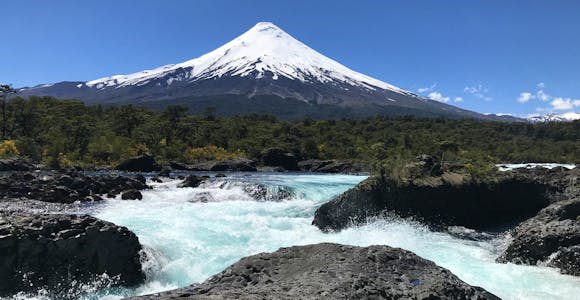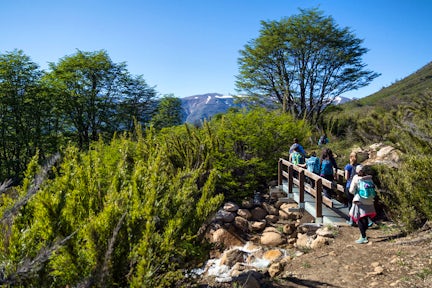
Vicente Pérez Rosales National Park
Snowy Osorno Volcano and the blue waters of Lake Todos los Santos usher visitors into one of the most accessible national parks in the Chilean Lake District.
Discover MoreDeep roots in Patagonia: We are ex-guides, tour leaders, outdoor enthusiasts, & adventurers.
We’ve got our feet on the ground: Impartial advice, a bespoke service, and at no extra cost.
For the ends of the Earth: Sustainability is more than our carbon footprint (but we’re reducing that too).

Alerce Andino is a beautiful temperate rainforest biosphere reserve that stands as the northern gateway to Chile’s epic Route of the Parks trail. Easily reached from the heart of the Lake District, its hiking trails wind up mountain ridges to tiny jewel-like lakes and wetlands rich in birdlife, all the while in the towering company of the region’s iconic millennium-old redwoods, the alerce trees that give the park its name.

Ancient alerce trees in Alerce Andino National Park
Alerce Andino (Parque Nacional Alerce Andino in Spanish) spreads over a large peninsula east of Puerto Montt. Established in 1982, its 970,000 acres make up the northernmost point of Chile’s 1700km-long Route of the Parks, as well as looking down onto Reloncavi, the first of the great crinkled fjords that run down the country’s length.
The park’s defining feature are the trees that give it its name. The alerce (known as laheun to the local Mapuche), carpets the park’s mountain slopes, growing up 60m high and living for several thousand years. Alerce wood is both water- and insect-resistant, which made it a prized commodity for construction and ship-building. Heavy logging led to the trees becoming endangered until the alerce was declared a national monument in the 1970s. They can be seen in several parks around the Chilean Lake District, but Alerce Andino has the greatest concentration of alerce forest, which covers almost half its area.
The park comprises mostly of dense temperate rainforest, with a particularly high level of endemism: one in three species here is found nowhere else. It is an excellent place for birdwatching, particularly around its many tiny lakes and lagoons (including black-necked and coscoroba swans). Among the leaf litter of the forest there are plenty of edible fungi, once an important food source for the Huilliche who lived here.
Alerce Andino is excellent for short hikes, with several marked trails. It is accessible year-round, though visitors should note that even in this particularly wet part of Chile, the park receives exceptionally high rainfall (as much as 4000mm per year) so it’s essential to pack waterproofs and boots appropriate for muddy trails.

Alerce Andino National Park
Most visitors to Alerce Andino enter through the park’s northern Sargazo sector. There are several well-marked routes that lead from the park stations, several of them along wooden boardwalks, which in many places protect the roots of the ancient trees from ground compaction caused by hikers.
Four trails lead from out from the park office near the Sargazo entrance. Three of these – Los Ulmos, Laguna Sargazo and Alerce Milenario – can be threaded together to make a full day hike. The shortest stretch, Los Ulmos, is particularly recommended by birdwatching, with a good chance of spotting the striking Magellanic woodpecker with its black body and scarlet cap. The Laguna Sargazo trail takes you over a suspension bridge to a small lake fringed with ferns and offering tremendous views, while the Alerce Milenario trail keep its trump card until the end, leading you to one of oldest recorded alerce trees in the park. This majestic tree, standing 60m high with a trunk 4m across is thought to be more than 2500 years old.
A popular longer day hike is around 10km to Laguna Frías along the Río Sargazo Valley. This includes the Alerce Milenario trail, but the more remote parts of the route are sometimes closed for maintenance due to their relative remoteness and the effects of the weather and landscape.

Hiking in Alerce Andino National Park
If you are approaching Alerce Andino from the south via Lenca, there are several easy day hikes through the park's Chaica sector.
The Salto Río Chaica and Alerce Milenario trail is the most popular, a short half-day hike that takes you through lush forest to a viewing platform overlooking the Chaica waterfall, and another of the park’s most ancient alerce trees. If you’re only making a brief visit, the El Encanto and Los Canelos trails are two short walks designed to give you a taste of the park.
Most of Alerce Andino’s trails are open all year, but those visiting in summer are able to enjoy the seasonal Laguna Chaiquenes and Triángulo trail to a series of particularly charming high mountain lakes. A portion of the trail involves fording the La Plata River; in winter its high, fast waters make it impossible to cross.
There are limited accommodation options in Alerce Andino National Park; most people visit to do day hikes from Puerto Varas.
If you’re visiting the park from its northern entrance, there is the simple Refugio Austral in the Sargazo sector. From the southern entrance, there is only the Chucao campsite in the park’s Chaica sector.
Alerce Andino is easily accessible by road from Puerto Montt, which has the most convenient airport for the Chilean Lake District, and from Puerto Varas.
There are three entrances to the park. The two northern entrances are at Correntso and Sargazo. Correntso is 31km due east from Puerto Montt; for Sargazo continue on the same road for another 12km as it loops south: most hikes start from here. The southern entrance is reached by following the coast road south 45km from Puerto Montt, turning off at the salmon farming town of Lenca to get to the park's Chaica sector.
If you’re travelling from the south along the Carretera Austral, you’ll need to take two car ferries to get to Alerce Andino: from Caleta Gonzalo to Hornopirén (twice a day in high season, six hours) and then the 30 minute crossing of the Reloncavi Sound between Puelche and La Arena, from where it’s 60km to the park entrance near Lenca.

Snowy Osorno Volcano and the blue waters of Lake Todos los Santos usher visitors into one of the most accessible national parks in the Chilean Lake District.
Discover More
Hornopirén is one of the least visited parks on Chile’s famed Route of the Parks trail, but its wild hiking trails temperate rainforest make it only more alluring for those …
Discover More
Lush rainforest, waterfalls, snow capped mountains, smoking volcanoes, glaciers and lakes: this national park has it all.
Discover More
Torres del Paine National Park, with its iconic granite Towers, is one of Patagonia's most popular destinations: a paradise for hikers and outdoor adventure activities.
Discover MoreWe'll spend some time listening to your aspirations, then discuss the kind of experience that might suit you.
Next we'll discuss the options, shortlist the best trips for you and present you our impartial recommendations.
We'll place a 24 hour hold on your preferred option - without obligation - whilst we talk through the details.
This website uses cookies to ensure you get the best experience on our website. Privacy policy